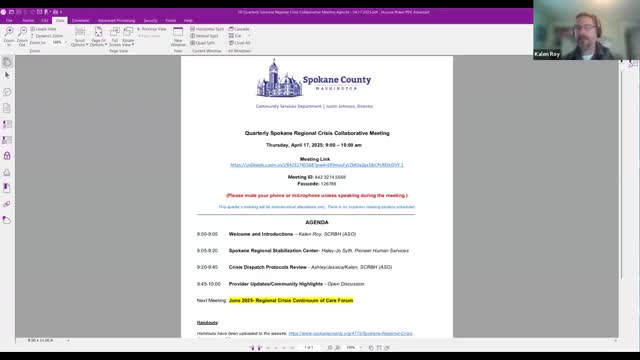Pioneer Human Services details three-program Spokane Regional Stabilization Center

Summary
Pioneer Human Services presented the Spokane Regional Stabilization Center’s three programs — mental health crisis stabilization, medically monitored withdrawal management, and a co-occurring residential program — including capacity, average lengths of stay, referral pathways and clinical exclusions.
Pioneer Human Services outlined the services and intake process for the Spokane Regional Stabilization Center during the Spokane Regional Scribe Collaborative meeting.
The Spokane Regional Stabilization Center is a “3 in 1 program,” Haley Jo Scythe, assistant director at Pioneer Human Services, said. The facility includes a 16-bed mental health crisis stabilization program, a 14-bed withdrawal management unit, and a 16-bed co-occurring mental health and substance use residential program.
The mental health crisis stabilization program serves adults 18 and older and generally provides stays of three to 10 days depending on acuity. Scythe said the program uses psychiatric ARNPs for medication management and assessments within 24 hours, provides comprehensive case management, individualized treatment planning, therapy and group programming. “Individuals that we serve are generally experiencing significant mental health crisis,” Scythe said.
The medically monitored withdrawal management program provides 24/7 nursing monitoring and in-house withdrawal medications; stays are typically three to five days. Scythe said the program performs a nursing and detox assessment at intake and offers SUDP counseling, group programming and case management. She noted exclusion criteria: the program cannot accommodate benzodiazepine withdrawal or detox from illicit methadone, though it can support transport to methadone clinics for dosing.
The co-occurring residential inpatient program is described as a 28-day stay subject to medical necessity. Services across the programs include daily or weekly methadone transportation, long-acting injectable medication for mental health, medication-assisted treatment for substance use disorders, peer bridging, housing specialists, lab and STI testing, and referrals to primary care. Scythe said Pioneer recently partnered with Consistent Care to provide HIV, hepatitis C and syphilis testing and linkage to treatment.
Pioneer accepts 24/7 referrals and performs a phone screening to assess medical necessity and program placement. Scythe said hospital referrals require additional documentation and a nurse-to-nurse interview because of higher potential medical acuity; law enforcement referrals typically provide demographic information to allow rapid drop-off of individuals from the community. Scythe said the center is “mainly Medicaid funded” and also takes Kaiser Permanente; the Spokane ASO is engaged for qualifying individuals.
Providers in the meeting asked about benefit limits and length-of-stay decisions. Scythe said there is never a guarantee of benefits; managed care organizations and ASOs determine ongoing medical necessity and maximum benefits, and Pioneer works with MCOs to seek extended stays when clinically indicated.
The presentation closed with an offer to distribute the slideshow to attendees and an invitation to contact Pioneer staff with further questions.

